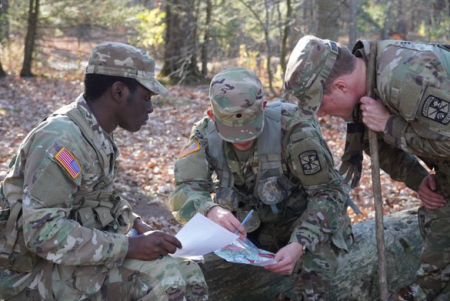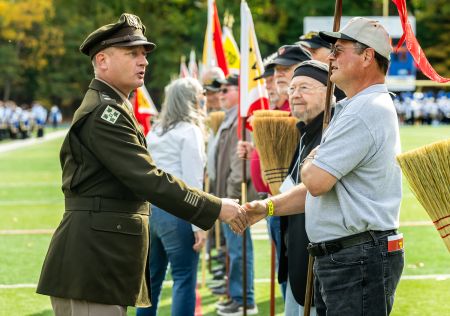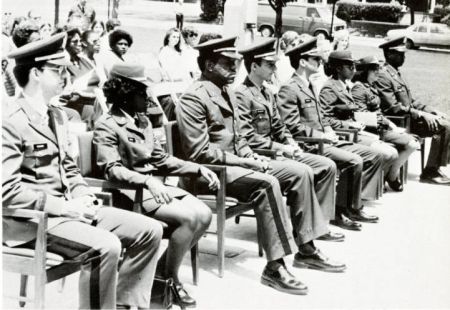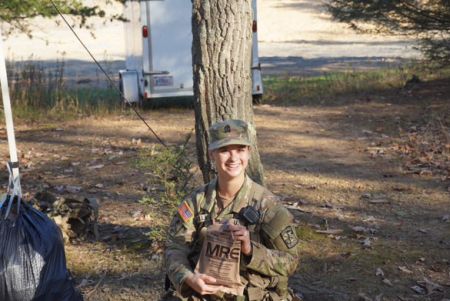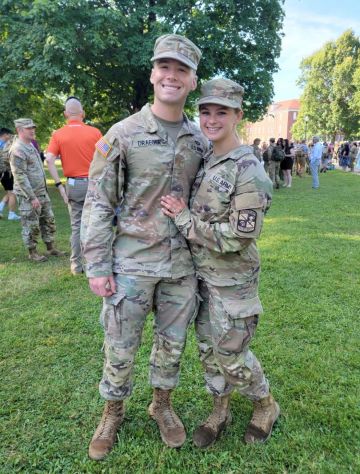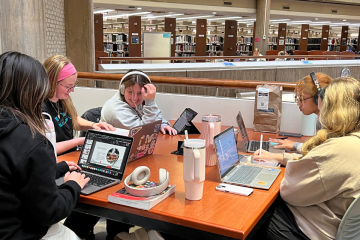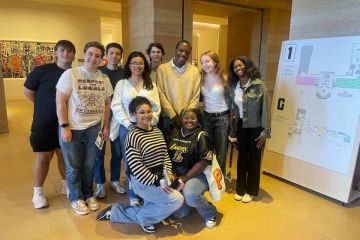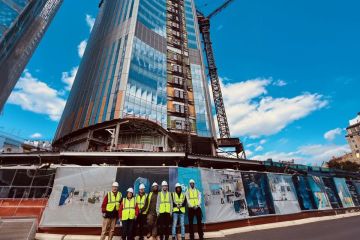Legacy Secured: Widener’s ROTC Program Looks to the Future While Honoring its Past

It’s pre-dawn and most Widener students are fast asleep. Not the cadets of the Reserve Officers’ Training Corps (ROTC) Dauntless Battalion.
They are hard at work in the campus' field house doing push-ups, pull-ups and other aspects of intense physical training. And they’ll be at it four times a week.
After training, the cadets, who have worked up a hearty appetite, will often go together for breakfast in the Pride Cafe.
Like other Widener students, they’ll attend the classes for their academic major. But these cadets also have military science classes and hands-on labs each week, where they study topics including ethics and morality, and learn basic infantry skills.
“As a cadre, academics is hugely important to us,” said Lt. Col. James Pascoe, who leads the Dauntless Battalion and serves as professor of military science. “To be an officer you have to get a degree, and we work one-on-one with our cadets to make sure their academics are on track.”
Leadership training is the beating heart of ROTC and it’s the cadets who run the battalion.
They're not your typical college students. Dauntless Battalion cadets commit eight to 10 hours a week to the program – balancing their civilian lives and responsibilities.
This life is not for everyone. But those who complete the ROTC program will commission as second lieutenants in the U.S. Army and pursue careers in various fields, from combat roles to nursing to engineering, and more.
Today's ROTC program is a direct descendant of Widener’s days as a military college, carrying on a time-honored tradition more than two centuries in the making.
An estimated 500 or more cadets since 1972 have commissioned into the U.S. Army from Widener’s program.
A Long, Proud History
ROTC at Widener in some form dates back to the 1860’s, but the ROTC program as it is known today was established with the signing of the National Defense Act of 1916. Widener, then Pennsylvania Military College, was one of the first group of schools to institute an ROTC program on campus, and it has existed in Chester ever since.
When the university became Widener College in 1972, a civilian ROTC program was launched and was quickly a success. Within two months of its conception, Widener College had two ROTC cadets named the top cadets at the U.S. Army 1972 Advanced ROTC Camp.
In 1978, the program saw its first three female commissioned officers – Patricia Dixon, Susan Turley, and Kim Terrell.
It is believed that Widener’s ROTC program has the longest continually manned professor of military science in the nation.
Although the civilian battalion’s name has changed over the years – from Pioneer to Freedom and now to Dauntless – the goal has remained the same: to equip students with the leadership and management skills necessary for a career as a U.S. Army officer or a successful civilian career.
Today, Dauntless Battalion is made up of four companies and serves as home to cadets from a number of area schools in addition to Widener including Neumann University, Penn State Abington and Brandywine campuses, Villanova University, West Chester University, Cheyney University, and Immaculata University.
Today’s Cadet
Though much has changed regarding military life on campus, some things never have, namely the commitment to serving one’s country, camaraderie among fellow cadets, fostering time management skills, and developing tomorrow’s leaders.
The camaraderie among cadets is a positive continuation of the PMC experience. We do the things that formed cadets back in the PMC days." — Lt. Col. James Pascoe
For current cadets and alumni of the program, these evergreen values and skills are at the vanguard of their experience.
Meghan Rampolla ’25, a nursing major, was attracted to the camaraderie even before she enrolled at Widener. Her grandfather, Bob Hawley, a 1962 PMC graduate, shared stories about the brotherhood of the corps, counting his fellow cadets among his lifelong best friends.
With a scholarship in hand and an athletic disposition, Rampolla enrolled in ROTC.
She was welcomed by the older students, especially the senior nursing majors. Rampolla soon ascended into leadership roles – including her current position as cadet first sergeant – and has used her leadership skills in her academic life, as well as in preparing for a career as an active-duty nurse.
Rampolla spent part of summer 2024 at Walter Reed National Military Medical Center in Bethesda, Maryland, shadowing staff nurses on 12-hour shifts. She got hands-on experience in the emergency room, operating room, and intensive care unit, and was tasked with giving patients their medication and IVs, taking blood sugar readings, and more.
“It was one of the best experiences. It was the first time feeling like a real nurse,” said Rampolla. “Being in ROTC, they give you these opportunities. It has definitely shaped my skills, my leadership ability, and I’m grateful for that. ROTC has given me a lot of great things.”
On that list of great things is her fiancé, Lt. Kevin Draeger, who graduated and commissioned from Widener in 2024.
“ROTC brought us together and our plans and goals are aligned,” said Draeger, who studied biomedical engineering at Widener and serves as an active-duty medical services officer in North Carolina.
Like Rampolla, Draeger’s grandfather is also a PMC alum, and Draeger benefitted from the camaraderie in Dauntless – his groomsman in his upcoming wedding are Widener cadets he commissioned with – and from the leadership development, a skill he uses as a platoon leader for Army medics.
“You have to organize and figure out how to lead your people, how to efficiently get your mission done, respond to situations, and make decisions under stress,” said Draeger.
Jobs of Tomorrow and the Future of Dauntless
A common misconception about the Army, notes Draeger, is that everyone who joins ends up as a frontline soldier in a combat role, sent off to war.
But today’s Army is highly skilled and diversified, with its service members touching nearly every major industry. Besides combat roles, careers include engineering, nursing, cyber security, logistics, intelligence, marketing, dentistry, veterinary medicine, and much more.
Widener cadet Darryl Villard ’25 studies robotics engineering and works for the university’s Information Technology Services department.
He plans to use the technical skills he’s cultivating in his future career. When he commissions in May, Villard will join the National Guard and hopes to pursue a career with the Signal Corps.
Villard says ROTC has helped him find his voice.
People here encourage me. ROTC has increased my confidence. I’m getting better at planning and teamwork.” — Cadet Darryl Villard '25
After more than five decades, what does the future hold for Widener’s ROTC program? Pascoe is optimistic.
“I think our future is bright, with the number of freshmen here. It’s encouraging. This is a warm environment that encourages people to come and to stay,” he said.
Interested in supporting ROTC through a donation? Support the PMC Legacy ROTC Scholarship fund.

